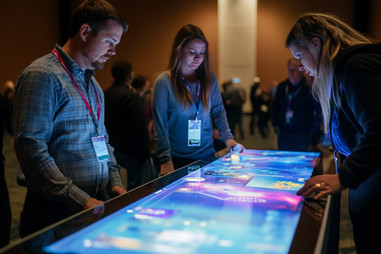Trends we will see in the Events Industry 2025
- Lauren Gasser

- Mar 18, 2025
- 5 min read
Updated: May 21, 2025
In 2025, the events industry will focus on trends like immersive experiences, hybrid models, wellness, AI, food & beverages, sustainability, data analytics, virtual reality, and seamless digital integration to enhance engagement and accessibility.

Wellness
We will see more wellness spaces integrated within events and meetings. (Guerra, 2025) This is due to the awareness of mental health and the lack of personal time given at an event. Coffee and Tea breaks are no longer used for a time out of the meeting but more a chance to catch up with work missed, so by implementing wellness spaces or activities this forces delegates to take that time to their self and refresh before the next meeting. Studies show the positive benefit to taking a break in day long meetings, as this can increase knowledge retention, encourage more networking and productivity. (Albulescu et al., 2022) These wellness spaces have been a hit for delegates as they are forced to relax through an activity or social space that is away from the meeting space.
This isn’t just a trend in the events industry, but you find that in 2025 there are more digital detoxes, the need to look after our bodies through healthy eating and exercising. The events world has picked up on the changes within our society and started to implement them.
What does this mean? Most likely we will see an increase in meeting spaces acquired, activities and breaks at meetings and conferences.
Food & Beverages
Another trend we are seeing so far in 2025 is companies being more invested in the quality of Food and Beverages served at their events. Whether this is a more varied selection to accommodate dietary and allergens or more organic and natural food and drinks (Excel London, 2022). As the event industry continues to evolve, we’re seeing that the way we approach Food and Beverages are changing. For example, there is an increase demand for organic food, which not only promotes better gut health but also supports sustainability efforts for the planet.
Alongside this, there are growing emphasis on offering a wider variety of meal options, ensuring that all dietary needs and allergens are addressed, and giving attendees more choices to suit their preferences (British Event Catering, 2024). Hydration Corners are also becoming a popular feature, encouraging delegates to stay hydrated while simultaneously reducing the reliance on single-use plastic. Another significant shift is the rise in demand for interesting non-alcoholic options, as more people seek healthier choices or have religious or cultural reasons for abstaining from alcohol.
In response to this, we’re also seeing a rise in mid-week dry hire offerings from hotels, as corporate clients move towards alcohol-free events during the workweek, reflecting a shift in preferences and priorities in the industry (Carnegie, 2023).
Tech
The event industry is embracing the change of technology and integrating this through all aspects of events. AI is gradually being integrated to streamline operations, enhance attendee experiences, and even provide AI-powered entertainment, like virtual presenters and interactive bots (Mentxu Sendino, 2025). However, despite the rise of tech, human interaction remains crucial, with attendees seeking genuine networking opportunities and meaningful face-to-face engagement.
Sustainability is also a key trend which can lead to many companies opting for paperless events, using digital solutions like QR codes and badges to reduce environmental impact and streamline experiences (Event Connections , 2025). This can lead to more innovative, eco-friendly, and interactive events.
Sustainability
Sustainability is now the main trend in the events industry, with a growing focus on reducing waste and minimising carbon footprints. Event organisers are increasingly prioritising eco-friendly practices, such as reusing materials like carpets, stands, and furniture, and donating leftover food to charities. Travel is also a key consideration, then venues are being selected for their proximity to offices, and attendees encouraged to use public transport or cycle to events, reducing carbon emissions.
Hotels are stepping up by offsetting their carbon footprints, and many are switching to eco-friendly, reusable products to reduce consumption (Ecology, 2023). As new sustainability legislation comes into play, such as the UK's alignment with the International Sustainability Standards Board’s (ISSB) IFRS Sustainability Disclosure Standards, the pressure to create more environmentally conscious events will only increase (IFRS, 2022).
Future
In the Future we may see a continuation of building on Technology and Sustainability. Also In-person events will increase and incorporate engaging activities to boost participation and collaboration. With hybrid working becoming the norm, companies may focus on making meetings more valuable, ensuring they are worth the time investment. Wellness activities and unique experiences might become more sought after, as attendees prioritise both mental and physical well-being. Conferences may shift towards shorter, more focused plenary sessions due to the decreasing attention spans of participants.
On the business side, companies could look for stronger partnerships with agencies and venues to foster better relationships which can negotiate better rates and improve overall efficiency—helping to streamline roles and reduce costs. Hotels may ask for more details to understand the clients’ needs and preferences, valuing feedback to continuously improve their offerings.
Technology will be enhancing event experiences, with tools for feedback collection, monitoring attendance, for example using AI, like facial recognition, to gauge attendee satisfaction or small details, such as badges that track environmental impact or popular areas (Parry, 2024).
References
Albulescu, P., Macsinga, I., Rusu, A., Sulea, C., Bodnaru, A. and Tulbure, B.T. (2022). ‘Give me a break!’ A systematic review and meta-analysis on the efficacy of micro-breaks for increasing well-being and performance. PLOS ONE, [online] 17(8). doi:https://doi.org/10.1371/journal.pone.0272460.
British Event Catering (2024). CustomerReviews. [online] British Event Catering. Available at: https://britisheventcatering.co.uk/event-catering-trends-2024/?srsltid=AfmBOopGRprz9Gxu9EoHlgS5sTSd5Oy7FDb5pnDt6QK-tBbDNKp-8j2u [Accessed 12 Mar. 2025].
Carnegie, M. (2023). Why workplace drinking culture is fading fast. [online] Bbc.co.uk. Available at: https://www.bbc.co.uk/worklife/article/20230320-why-workplace-drinking-culture-is-fading-fast.
Ecology, C. (2023). The Carbon Emissions of Staying in a Hotel. [online] Circular Ecology. Available at: https://circularecology.com/news/the-carbon-emissions-of-staying-in-a-hotel.
Event Connections (2025). Event Connections. [online] Event Connections. Available at: https://www.event-connections.co.uk/on-site/badge-printing-system?gad_source=1&gclid=Cj0KCQjwkN--BhDkARIsAD_mnIpwfCtgVEha9-EuHqMPvfM80jQKZvgX6uTcA2nIodZN2JSpaeMBg_8aAnyhEALw_wcB [Accessed 17 Mar. 2025].
Excel London (2022). Insight: the top five food trends in the events industry | Excel London. [online] Excel.london. Available at: https://www.excel.london/insight-the-top-five-food-trends-in-the-events-industry.
Guerra, R. (2025). Top 5 Meeting and Events Trends for 2025. [online] 1Wimpole Street. Available at: https://1wimpolestreet.co.uk/top-5-meeting-and-events-trends-for-2025/ [Accessed 21 Feb. 2025].
IFRS (2022). International Sustainability Standards Board. [online] IFRS. Available at: https://www.ifrs.org/groups/international-sustainability-standards-board/.
Mentxu Sendino (2025). Introduction to AI in Events: Use Cases to Get Started. [online] Eventscase Event Industry Blog. Available at: https://eventscase.com/blog/ai-in-events-use-cases-to-get-started.
Parry, A. (2024). What will the events industry look like in 2049? | EIN. [online] Eventindustrynews.com. Available at: https://www.eventindustrynews.com/guest-blogs/what-will-the-events-industry-look-like-in-2049.
#limebluesolutions #travel #hotels #events #design #venue #live #virtual #production #av #incentives #rewards #client #sitevisit #uk #teammeeting #successful #LuxuryHotelsUK #venuefinding #eventprofessionals #eventprofsuk #berkshire #cookham #creativesolutions #eventstyling #lifestyle #limebluesolutions #wellness #food #beverages #tech #sustainability #future #toptrends #trends #eventtrends #2025








































Comments